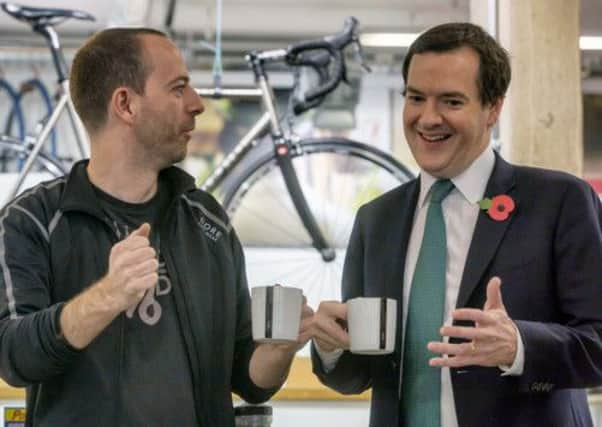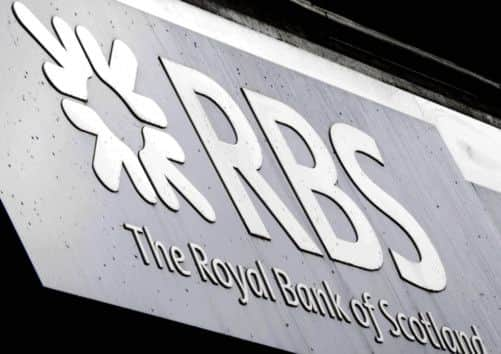RBS: Blow for Cameron as sell-off put back


The Prime Minister’s hopes of a pre-election boost through the re-privatisation of RBS were dashed when George Osborne effectively dismissed selling-off the publicly-owned bank before the UK goes to the polls.
Mr Osborne’s admission came as RBS revealed a pre-tax loss of £634 million for the quarter ending in September. The loss caused the bank’s shares slump 7.5 per cent to 340p yesterday.
Advertisement
Hide AdAdvertisement
Hide AdIt was also confirmed that RBS will not split into so-called good and bad banks, a move that had been recommended by prominent finance experts who believed the retail bank should be separated completely from toxic loans.


Instead of a radical break-up, RBS will create an internal “bad bank”, ringfencing £38 billion of bad assets – including the loans that it does not expect to be repaid.
The path that the bank intends to follow as it attempts to recover came to light as RBS’s third-quarter results were published yesterday alongside two other reports on the bank – one commissioned by the UK government into the possibility of splitting the bank and another highly critical report into its small lending practices by Sir Andrew Large, a former deputy governor of the Bank of England.
Mr Osborne said ringfencing £38bn problem assets within RBS would make it easier for Britain’s taxpayers to “get our money back”. But crucially, he said the sale of RBS was “still some way off”, adding: “I think, quite frankly, it is unlikely before the General Election.”
There had been widespread speculation within the UK government that RBS and the state-owned Lloyds Banking Group could be sold before the next General Election in a bid to distance the coalition from a £65bn taxpayer bail-out associated with the economic crisis that began under Labour.
The prospect of an RBS sale was triggered by briefings to the City from Tory sources suggesting that RBS could be sold at a price below the 500p per share which the Labour government paid in 2008.
The briefings were interpreted as a sign that the government was considering selling off RBS before the 2015 election.
Yesterday, the RBS chairman, Philip Hampton, who had previously claimed the bank could be ready for privatisation in 2014, acknowledged that the timescale had been pushed back.
Advertisement
Hide AdAdvertisement
Hide Ad“If it’s felt that in order to get the best value you need to have a reliable dividend stream then we’re definitely further away from that because of the capital changes and business changes that have taken place,” he said.
Mr Cameron’s opponents said it would be a “huge disappointment” to the government that re-privatisation had to be put on the back burner. But there was agreement across the parties that taxpayers should not lose out when the sell-off finally takes place.
Stewart Hosie, the SNP Treasury spokesman, said: “It will be a huge disappointment that they now appear to be unable to sell the bank on in any way before 2015, but they must not rush into it. There must be no foolish pre-election move that sees the taxpayer lose out.”
Labour’s Treasury spokeswoman Cathy Jamieson said: “The priority here has to be that taxpayers see a return on the money that was invested into RBS and not the political agenda of the Prime Minister or Chancellor.”
RBS, which needed a £45bn taxpayer bailout in 2008, said the bad bank will contain about £9bn of assets from Ulster Bank, as well as problem commercial property loans.
The decision to keep the bad assets within the bank, but ring-fenced and managed separately, goes against the guidance of the Parliamentary Commission on Banking Standards, which this summer said there was a case for removing toxic loans from RBS.
The former Bank of England governor Sir Mervyn King also backed a full split of the lender.
Yesterday RBS’s new chief executive, Ross McEwan, said he was pleased to end the good bank-bad bank debate because “the uncertainty had hung over the business for far too long” and had taken up too much management time.
Advertisement
Hide AdAdvertisement
Hide AdMr McEwan admitted that the bank “must do better” when confronted by the report by Sir Andrew Large, which found a host of problems in the way RBS treats small and medium-sized enterprises – including long delays on approving loans and poor treatment of struggling borrowers.
Mr McEwan said the bank accepted the report and will address it in its review, which aims to “create a bank that can reward the faith of UK taxpayers and all our investors”.
He said: “We are hugely indebted to the public of the UK for putting their hands into their pockets and saving this great institution.”
Mr McEwan has begun a review which will report back in February and will see heavy cost-cutting and a sharper focus on business lending. It will also speed up the sale of its Citizens US banking subsidiary, with a partial flotation next year.
RBS said it would make a heavy loss this year partly because it plans to sell the assets held by the internal bad bank more quickly than originally planned.
It will sell up to 70 per cent of these within two years.
RBS said that it would take a charge of £4bn to £4.5bn in the current quarter to cover the losses on the loans.
Traders suspended as probe is widened
Traders are understood to have been suspended at Royal Bank of Scotland and Barclays in connection with the possible fixing of currency markets as a global investigation widens.
Reports suggest Barclays has suspended as many as six foreign exchange traders, and that RBS yesterday put two of its traders on suspension as part of the probe involving regulators in the UK and worldwide.
Advertisement
Hide AdAdvertisement
Hide AdBoth banks declined to comment on the suspensions, but have confirmed they have been drawn into the investigations.
RBS said in its third-quarter results yesterday it had been contacted by the Financial Conduct Authority and other authorities.
Barclays said alongside its trading update yesterday that it was also co-operating with inquiries from various authorities and was reviewing its foreign exchange trading activities, over a period of several years to August this year.
Bill Jamieson: There may be little choice but to drink from poison chalice
How did it take so long for the “good bank-bad bank” issue to be resolved at RBS?
A decision that should have been taken four years ago in the immediate aftermath of the bank’s near collapse would almost certainly have brought the prospect of a sale of the taxpayer’s 81 per cent holding that much closer. Now it has been pushed back until after the 2015 general election.
A decision had to wait for the thunderclouds to clear and for a proper assessment to be made of what were and were not irrecoverable loans. There were regulatory uncertainties. Would the European Commission see a bad bank hive-off of £38 billion of toxic loans to the Treasury as effective state aid?
All this leaves it with some tricky decisions. The internal hiving-off of this mountain of toxic loans into an RBS “capital resolution group” has to be funded by the bank and carried on its balance sheet. It has targeted a core tier 1 ratio of around 11 per cent by the end of 2016 against eight per cent now.
Advertisement
Hide AdAdvertisement
Hide AdYesterday chief executive Ross McEwan warned that the first tranche of rotten loan disposals will mean a £4bn rise in loan losses in the fourth quarter and lead to a “substantial” loss for the full year.
The hope is that an improving economy and recovering appetite for commercial property investment might enable RBS to dispose of the toxic assets at something more than fire-sale prices. But while there is some recovery in this sector it is still nascent, and RBS may have little choice but to bite the bullet and take the losses.
MORE INFO